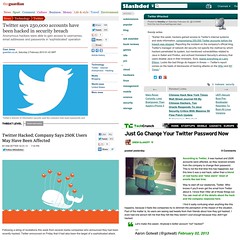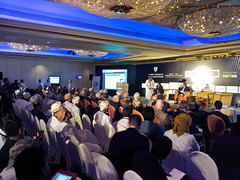 |
| Courtesy of Pixabay |
The Problem is Real
| “Twitter Hacked: 250k accounts affected” #security #socialmedia / SML.20130202.SC.PublicMedia.Twitter.Hacked (Photo credit: See-ming Lee 李思明 SML) |
Two Exploits That need to be Plugged
These nefarious criminals primarily exploit these social nets in two ways. The first is by means of specialized hacker code designed to gain access to, or install itself cases these
We All Pay for This
The cost to society is extensive. Cost can be measured as lost revenue for a business and its advertisers. A loss of a subscriber also cost money. Acquiring new subscribers and retaining them is always a major cost to any business. Fraud prevention and security cost are high and fraud recovery costs cannot often be measured accurately. The annual cost to the world at large is in the billions. It's often hard to get accurate statistics because most of the fraud is tracked by category, (mobile, viruses, Trojans, phishing, drive by, website impersonation, etc.…) and most don’t combine their statistic preferring to list them separately. Reported Internet scams in the USA top 485 million in 2010. The last worldwide figures I could find were with NBCNews.com which reported 2.6 billion in 2004. That article also went on to say that, annual increases were coming in at 700 million dollars a year. That would put the current worldwide fraud rate at
A 2011 ComScore report estimated that anywhere from 2.7 to 10.1% was the worldwide website fraud rate. The article went on further to point out that if we assume a 6% average rate that 72 million users are at risk of becoming fraud victims’ in the USA alone.
Who’s Getting Hacked?
 |
| Courtesy of Wikipedia |
You ARE Vulnerable; Read the List
The FBI’s counterintelligence agency provides a long list of tactics used to compromise a person’s sensitive and financial information. The FBI’s has been posting new warnings about the increased number and sophistication of these attacks for quite some time now. A previous article we wrote discusess Phreaking
The Solution
| Cyber |
| Cyber Security at the Ministry of |
In this article, I discussed the overall vulnerability problem we now face because of the growth and widespread adoption of social networks. We have discussed the massive cost of this problem, who is being attacked and why we are vulnerable. We have discussed the types of attacks being perpetrated and the possible solutions needed to solve this massive problem. If you have enjoyed and learned something from this article, pass it on to your friends. If you have any additional ideas about this subject share them with our readers. Cyber attacks have been increasing exponentially over the last couple of years. Until all Internet users implement protective measures, engage in smart and defensive surfing and start to use social media in a more prudent manner, this problem will only grow. I hope you take the FBI’s warning seriously and implement some of the solutions I have talked about here.

That’s my opinion; I look forward to hearing yours.

That’s my opinion; I look forward to hearing yours.
If you like this article, you can find more by typing in ”Internet security" in the search box at the top left of this blog. If you found this article useful, share it with your friends, families and co-works. If you have a comment related to this article, leave it in the Comment sections below. If you would like a free copy of our book, "Internet Marketing Tips for the 21st Century," fill out the form below.
Hector Cisneros is COO and director of Social Media Marketing at Working the Web to Win, an award-winning Internet marketing company based in Jacksonville, Florida. He is also co-host of the weekly Internet radio show, "Working the Web To Win" on BlogTalkRadio.com, which airs every Tuesday at 4 p.m. Eastern. Hector is a syndicated writer and published author of “60 Seconds to Success.”
Related articles





No comments:
Post a Comment